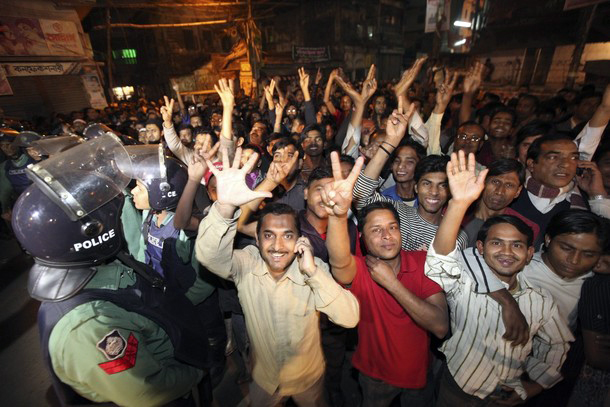
Bangladesh’s long national nightmare is finally over. Not entirely over, of course. There are still six convicted killers absconding beyond the reach of the law, and there remain, and perhaps always will remain, unanswered questions about that dark night in Bangladeshi history and its aftermath.
But with the execution of five of the condemned killers of Sheikh Mujibur Rahman, the man who led the nation to independence and was our first president, a bloody and tragic chapter in Bangladesh’s history has come to a close.
The execution of the verdict has reaffirmed the rule of law in a country where impunity has too often protected the powerful and shielded them from justice.
An indemnity ordinance indemnifying those who had assassinated Sheikh Mujib and massacred his family on August 15, 1975, was passed into law by the man the coup-makers installed as president and was subsequently enshrined in the constitution by Lt Gen Ziaur Rahman after he seized power in November of that year.
It remained in place until the Awami League (AL) government of Sheikh Hasina (Mujib’s daughter) came to power in 1996. With the provision overturned, the legal case could finally commence 21 years after the assassination. However, even though a verdict was reached in 2001, with the election of a BNP (Bangladesh’s other major political party, founded by Gen Zia) government at the end of the year, the case was again shelved until the AL returned to power last year. It took another year before the appeals process was finally exhausted and the killers walked the gallows.
The impunity enjoyed for so long by the killers told the Bangladeshi people two things. The first was that those who were behind the killings remained close to power and enjoyed the de facto protection of the state. It was a constant grim reminder for those who felt that the country had taken a decisive and debilitating step backwards with the August 15 killings that the powers behind the assassination remained in the ascendant.
Now, for the first time since 1975, we can feel that the country is truly back on the right track. Now we can look to the future with confidence, secure in the knowledge that some of the country’s demons will forever remain in the past and that we need not fear their resurgence again. If the killers can be brought to justice, this means that the pendulum might just finally be swinging back the right way.
The second thing that the killers’ impunity told the nation was that nothing was as it seemed and that we lived in a country where real power was wielded by those in the shadows – where even the country’s founding president and independence leader could be brutally massacred together with his family without consequences or accountability. Small wonder that a sense of powerlessness and hopelessness was part of our resulting national inheritance.
I don’t know if we have ever really examined the corrosive impact this phenomenon has had on our society. Like the failure to hold war crimes trials, these missteps have warped and disfigured our national consciousness. The psychological damage has been massive, the burden crippling.
The execution of the verdict has had the principal benefit of allowing us to begin to close this sorry chapter in our history and turn our faces to the future. As long as we continued to fight the battles of yesterday and as long as these battles remained unresolved and were left to fester, how could we ever move forward as a nation?
This isn’t a day of celebration. But as a nation we can take satisfaction in the fact that today we have seen justice done. This is a day of reaffirmation. Today we reaffirm our belief in justice and the rule of law, and we reaffirm the debt of gratitude this nation owes the man without whom we would still be a province of Pakistan.
No nation can survive without its heroes. It has been one of the shameful inheritances of the past 35 years that we have built a nation that does not honor its heroes. No nation that dishonors its greatest can hope to take its place as a proud and self-respecting nation among the world community.
Sheikh Mujibur Rahman was the indispensable man of Bangladeshi history, the man without whom we would not be independent and without whose leadership we could not have forged a nation. He deserves his due in our history, and an integral part of that process is bringing his killers to justice.
Zafar Sobhan is the Editorial & Op-Ed Editor for The Daily Star, Bangladesh’s leading English language daily newspaper. Reuters Pictures.
Image: BangladeshTrials.jpg
